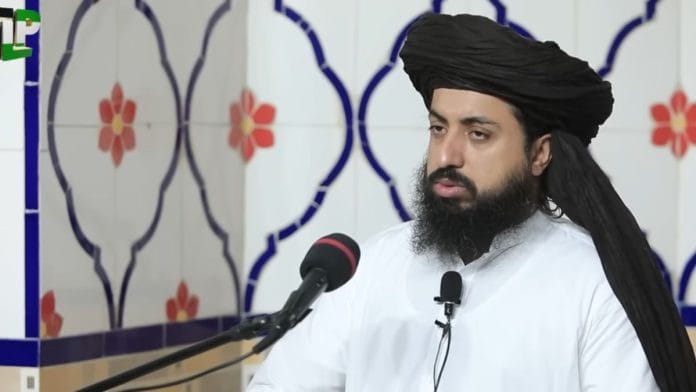New Delhi: As tensions between India and Pakistan rise, a far-Right Islamic leader, associated with Tehreek-e-Labbaik Pakistan, has made calls for Pakistanis to “take up arms against India”. The irony is not lost on Pakistanis. They are asking, “When is this rioter going to fight himself?”.
“Your desi bandook (gun) will do the wonders that their rifles can’t,” Saad Hussain Rizvi, the second Ameer of TLP, proclaimed in a fiery sermon, ‘Khutba E Jummah’, delivered in Lahore on 2 May.
To win wars, he said, it’s important to be a “good Muslim” first: “Nowadays, I can see discussions pointing out how India has advanced weapons, Israel has advanced weapons, but Pakistan has nothing…to them I will say, you need to have the intent to fight. Then, nothing can make you lose…be a good Muslim.”
Rizvi was appointed as TLP’s new head in 2021, succeeding his father, the TLP founder Khadim Hussain Rizvi.
In his Friday speech, Rizvi mocked India’s “36-hour ultimatum to strike Pakistan”, stating that “India should have entered Pakistan within the first 24 hours”. The remark was met with loud cheers from his supporters.
However, the call to arms was met with scepticism and criticism on social media. While some YouTube users praised his words, X users were not so kind.
Criticising Rizvi’s credibility, user Ali Gulshad said: “You yourself ran away from the US Embassy before the protest. You can only blow your trumpet in speeches,” he said. Gulshad was referencing TLP’s 1 May march in support of Palestine, from Faizabad to the US embassy in Islamabad, which was postponed.
X user Bhadur Hashmi called Rizvi a “sell-out maulvi” for postponing the march.
Why TLP is controversial
Saad Rizvi’s TLP is no stranger to controversy, infamous for its relentless attacks on Ahamadiyyas, false blasphemy allegations, and calls to kill supreme court justices. The party, founded in 2015, often resorts to violent protests to pressure the government into meeting its demands. And it has been linked to attacks on police officers.
In the past few months, the TLP has openly called for violence against Ahmadiyyas, declaring that the community has no right to live in Pakistan. In Punjab’s Bahawalnagar, TLP leaders incited attacks on Ahmadiyya homes and mosques, leading to widespread fear and displacement within the community. These actions have drawn condemnation from human rights organisations and calls for the TLP to be banned.
Despite these allegations, the TLP continues to hold significant political influence. In the 2024 general elections, the party secured nearly 2.9 million votes nationwide, becoming the fourth-largest party in Pakistan. In the province of Punjab alone, it received nearly 2.5 million votes, making it the third-largest party in the region. The TLP currently holds one seat in the Punjab Assembly.
Also read: Pakistan Army’s new morale-boosting song greeted with memes & mockery
‘Don’t test our silence’
Other prominent religious leaders in Pakistan have also echoed strong concerns over the rising tensions, and India’s suspension of the Indus Waters Treaty. They are framing the issue not only as a legal breach but as a religious, moral, and humanitarian crisis.
At a joint press conference in Quetta on 3 May, leaders of various religious parties stressed that the sanctity of the treaty must be upheld. “Upholding the Indus Waters Treaty is a religious obligation and a moral duty,” they said, vowing to raise the matter at “every relevant forum”, Dawn reported.
In a unanimous resolution, the conference declared that any breach of the treaty was equivalent to “pushing global peace into darkness.” Pakistan has always respected international laws, diplomatic agreements, and global trust, they said, calling the Indus Waters Treaty a “serious peace initiative” by Pakistan.
The religious leaders then warned against testing Pakistan’s silence on the matter: “As a nuclear, military, ideological, and moral power, Pakistan’s silence— along with that of its scholars and people — should not be mistaken for weakness.”







Pakistan’s scholars? Who are they referring to? Is it the Maulanas?
Bloody fools.